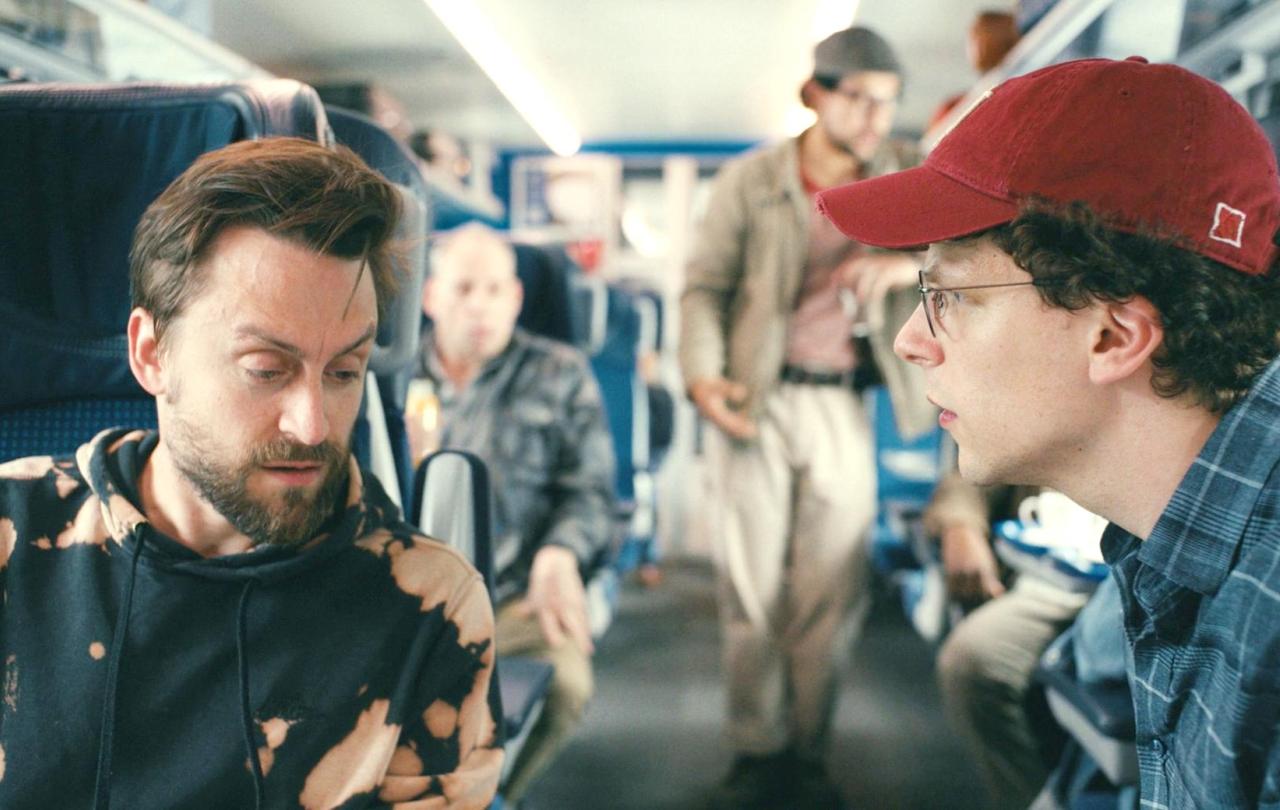
In today’s ultra-developed world, where technological and medical advances have reached unprecedented heights, suffering remains an unsolved problem. While the World Health Organization claims the successful prevention, elimination, or treatment of more diseases than ever before, it also highlights significant increases in anxiety, depression, and stress-related disorders worldwide. This paradox raises questions not only about the root causes of mental health suffering but also about the way we understand its current prevalence and impact. Are today’s struggles any different to those others have experienced before us? Is the pain equally real? As we approach the eightieth anniversary of Holocaust Memorial Day, can we truly equate the silent struggles of contemporary emotional health challenges with the unimaginably harrowing experiences of those who endured the worst horrors of war, violence, and genocide?
Jesse Eisenberg dares to tackle these complex questions with his directorial debut, A Real Pain, a masterful exploration of trauma, resilience, and the search for meaning. Co-starring Kieran Culkin in a career-defining performance, the film takes viewers on a journey that is part road trip, part comedy-drama, part historical reflection, and wholly compelling. I believe it offers a timely and deeply thought-provoking challenge to consider how we recognise and process pain across generations as well as understand the way pain shapes – and reshapes – our lives.
In the film, Eisenberg and Culkin portray two estranged Jewish-American cousins, David and Benji, who embark on a shared mission to retrace the steps of their grandmother, a Holocaust survivor. What begins as a simple road trip to Poland quickly transforms into something much more as the brutal reality of intergenerational trauma and mental health struggles rise to the surface. The film’s themes can be explored through three key lenses: the passing on of pain, the proximity of pain, and the problem of pain.
The passing on of pain
At its heart, A Real Pain is a story about legacy—the burdens and blessings passed down through generations. Though their shared grandmother is no longer alive, her story of survival, resilience, and eventual flourishing has left a profound impact on her descendants. Her story draws the cousins in, but it also draws them together and apart in different ways over the course of the trip. There is tragedy and comedy, and poignant moments of connection as well as frustration as Eisenberg explores how trauma echoes through generations, affecting different people in different ways, weighing heavily on those who did not live through the original events. This theme is handled with nuance showing both the strength and fragility that come from confronting a painful past. Ultimately it brings us to a new question – how do we honour the suffering of those who came before us while also finding our own path, or paths, to healing?
The proximity of pain
As the cousins delve deeper into their family’s history, the film juxtaposes the grandmother’s resilience in the face of antisemitism, war, and Holocaust with Benji’s struggles. Despite severe loss, grief and trauma, the grandmother went on to live a meaningful life. Benji on the other hand struggles to keep on top of his daily responsibilities, hold down a job, and maintain relationships. He struggles to find any meaning in his life and reveals he has attempted suicide. How, he wonders, did his grandmother find the strength to fight for her life against the backdrop of the Holocaust when he can’t even navigate the relative peace of middle-class America? This question seems to add to his despair. He seems thoroughly beaten.
Eisenberg does not provide easy answers but instead invites viewers to wrestle with these complexities of life and death, resilience, and vulnerability. He forces us to confront our assumptions about suffering and strength. By making us reflect on which pain is more real, he seems to have found a way to challenge us both to honour the reality of past trauma and recognise the reality of the struggles faced by those around us. He has certainly found a way to help us empathise both with the millions of people who are currently displaced and traumatised by violence, conflict, and displacement, and, equally, with the millions whose mental health is in tatters.
The problem of pain
At its core, A Real Pain tackles the universal question: what do we do with suffering? Do we bury it in the past? Do we pretend it does not exist? Do we insulate ourselves from the pain of others? Do we respond with frustration and anger or with patience and empathy? Do we accept pain as a tragic by-product of existence? Do we struggle under the burden of it? Do we let it defeat us? Do we find ways to learn from it? Can pain make us stronger? Can it make us better people? Does it point to something deeper within us or, indeed, something beyond us?
Right in the middle of the film, David and Benji meet a survivor of the Rwandan genocide. who provides a stark reminder that the horrors of the Holocaust are not just consigned to history, that even today there are places where entire people groups are being targeted, destroyed, and displaced. This character has clearly found solace and meaning through his faith, in contrast to the cousins’ secular Jewish identities. The tension between belief and unbelief runs through the film and reflects the wider experience of many for whom pain has been a critical factor in their journey either to faith or away from it.
For C.S. Lewis, the author of the Narnia chronicles who offered spiritual solace to the nation during the Second World War and who was personally familiar with suffering writes: “God whispers to us in our pleasures, speaks in our conscience, but shouts in our pains: it is His megaphone to rouse a deaf world.” Pain, for many Christians like Lewis is supposed to draw us towards faith – it is an urgent invitation to seek meaning and connection in a fractured world. Pain reminds us of our mortality and vulnerability, and our dependence not just on others, but perhaps too on an Almighty being who offers hope, healing and the promise of a life beyond this in a world where there is no more death, no more tears, no more pain.
With A Real Pain, Jesse Eisenberg has crafted a film that will make you laugh and cry and think and discuss and reach out to others, or even to God. This film invites you to reflect on the past, present and future, to wrestle with the pain we carry and to seek meaning beyond it. It’s a must-watch for anyone who dares to reflect on life’s most profound questions.
Join with us - Behind the Seen
Seen & Unseen is free for everyone and is made possible through the generosity of our amazing community of supporters.
If you’re enjoying Seen & Unseen, would you consider making a gift towards our work?
Alongside other benefits (book discounts etc.), you’ll receive an extra fortnightly email from me sharing what I’m reading and my reflections on the ideas that are shaping our times.
Graham Tomlin
Editor-in-Chief





